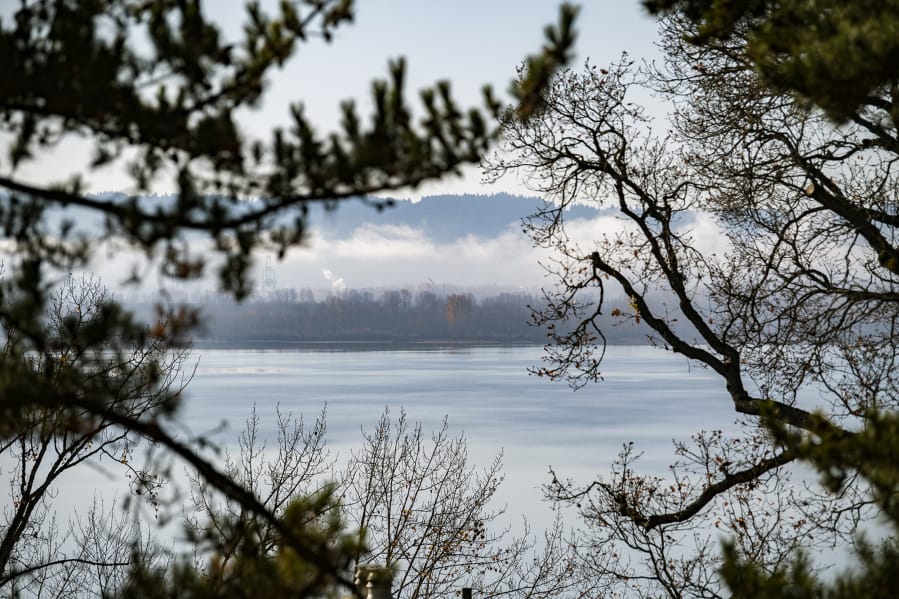Friends of Vancouver Lake is seeking state action to reduce cyanobacteria and other water quality problems that have plagued the 2,300-acre lake for decades.
The group’s efforts already have produced results.
Washington State Department of Ecology Director Maia Bellon received a briefing on Vancouver Lake on Friday.
A few days earlier, a bipartisan group of six local legislators asked the state to place Vancouver Lake on its priority list for water quality improvement plans.
“There is no magic silver bullet,” said Andrew Kolosseus, Ecology’s water quality manager in Southwest Washington, who attended Friday’s meeting with Bellon. “Vancouver Lake is a shallow water body, and there are a lot of challenges with shallow lakes.”
Kathy Gillespie, co-chair of Friends of Vancouver Lake, is working to bring more attention to bear on the lake’s long-standing water quality problems.
“I know a lot of people who paddle down there,” she said. “Anyone who spends time on the lake, I think, falls in love with it.”
Love alone won’t solve the lake’s problems. Milfoil, an invasive aquatic weed, threatens to choke the lake in a tangle of thick vegetation.
Friends of Vancouver Lake intends to treat the milfoil with an herbicide, ProcellaCOR, in spring 2020. Treatment was delayed in August because the weeds had stopped growing and would no longer effectively absorb the herbicide.
“You do a big treatment to beat it back,” Gillespie said. “And then you do annual treatments to keep it down.”
Milfoil is only Vancouver Lake’s most recent problem.
Cyanobacteria blooms, often called blue-green algae, typically prompt health officials to close the lake on one or more occasions each summer, its busiest period for rowing, sailing and other recreation. Elevated levels of E. coli bacteria also have triggered closures.
Economic impact
In August, the Western Region Dragon Boat Racing Championships had to move from Vancouver Lake to Ridgefield Marina on Lake River. In July, Paddle for Life canceled its dragon boat races at the 11th hour because of elevated levels of cyanotoxins.
Gillespie said big events at Vancouver Lake bring in visitors who stay in hotels, eat at restaurants and shop at stores.
“Friends (of Vancouver Lake) believe, without question, that it’s an economic engine,” she said. “There always has been a vision by this community to take Vancouver Lake and make it the centerpiece of outdoor recreation.”
Friends of Vancouver Lake has hired E.D. Hovee & Co. to prepare an economic impact study of events at Vancouver Lake, as well as how much money is lost when the lake closes because of cyanobacteria and E. coli.
“No, it’s not a gold mine,” Gillespie said about the lake’s economic potential. “But it is an opportunity for Vancouver to add one more thing to our portfolio.”
Establishing a TMDL
Friends of Vancouver Lake, along with six legislators, is asking the Ecology Department to place the lake on its priority list for establishing a total maximum daily load, or TMDL.
A TMDL represents the maximum amount of pollutants a lake, creek or river can receive and still meet water quality standards.
The Ecology Department already has set a TMDL for Salmon Creek, which connects to Vancouver Lake through Lake River. The state also is establishing a TMDL for Burnt Bridge Creek, which flows directly into the lake.
The federal Clean Water Act requires states to develop TMDL plans for water bodies on the state’s polluted waters list. Vancouver Lake was placed on that list 15 years ago.
“We want to get on the priority list to receive a TMDL, which is Step 1 in addressing water quality issues in the lake,” Gillespie said. “It’s going to put us in line to get a water quality improvement plan.”
Sen. Annette Cleveland, D-Vancouver, Sen. Ann Rivers, R-La Center, Rep. Sharon Wylie, D-Vancouver, Rep. Paul Harris, R-Vancouver, Rep. Monica Stonier, D-Vancouver, and Rep. Larry Hoff, R-Vancouver, signed a letter dated Tuesday requesting more state attention for Vancouver Lake.
“We fully support and encourage the efforts to elevate Vancouver Lake and its tributaries on the state’s priority list for both a formal TMDL study and appropriate funding for a water improvement plan,” the letter says. “We ask the Department of Ecology to recognize that this long-neglected water body deserves much-needed state support.”
Kolosseus said the Ecology Department will accept comments through Friday on which polluted water bodies should receive priority for setting TMDLs.
Comments can be submitted online at wq.ecology.commentinput.com/?id=NCdW7 or mailed to: Lara Henderson, PO Box 47600, Olympia, WA 98504.




